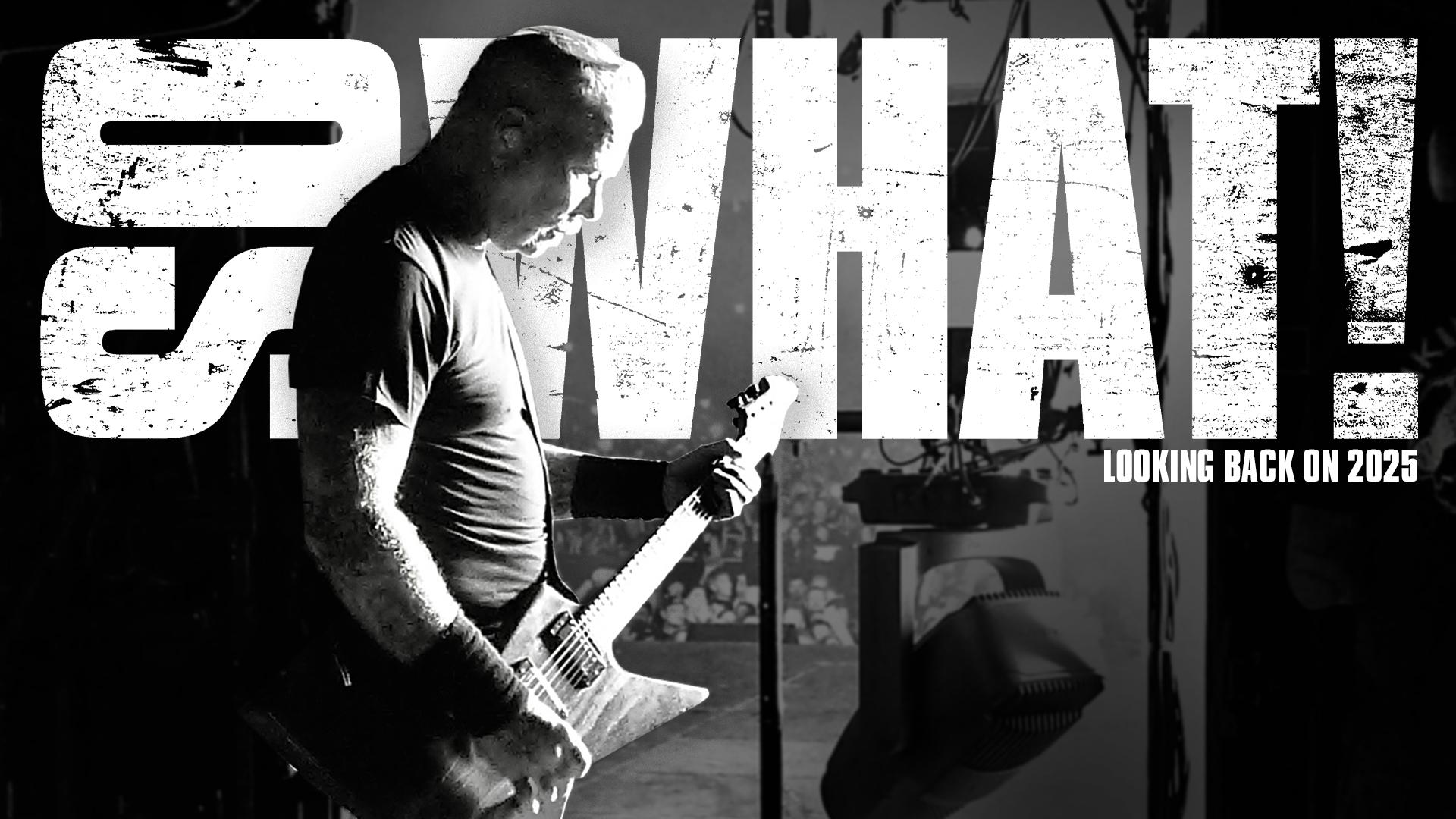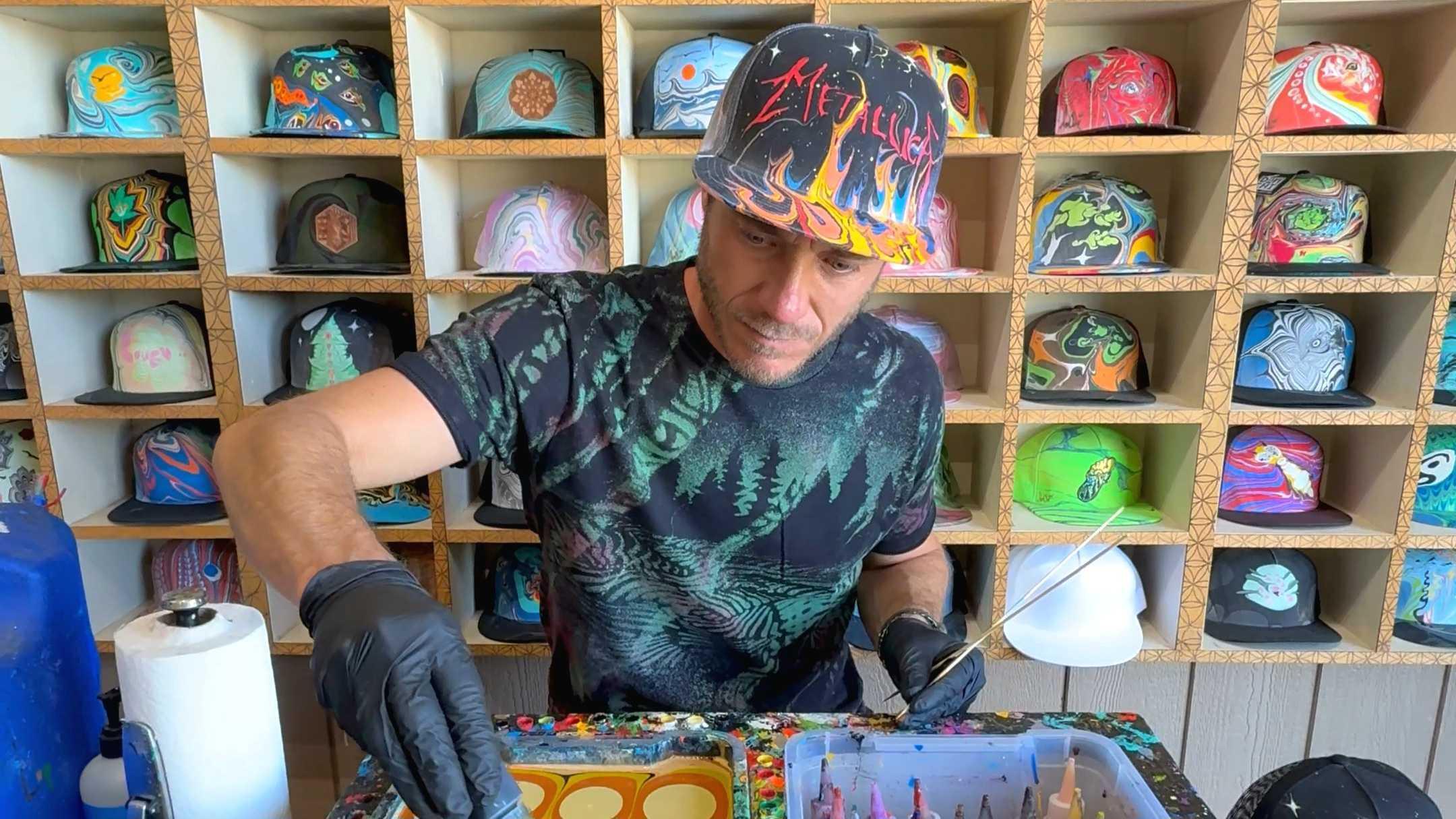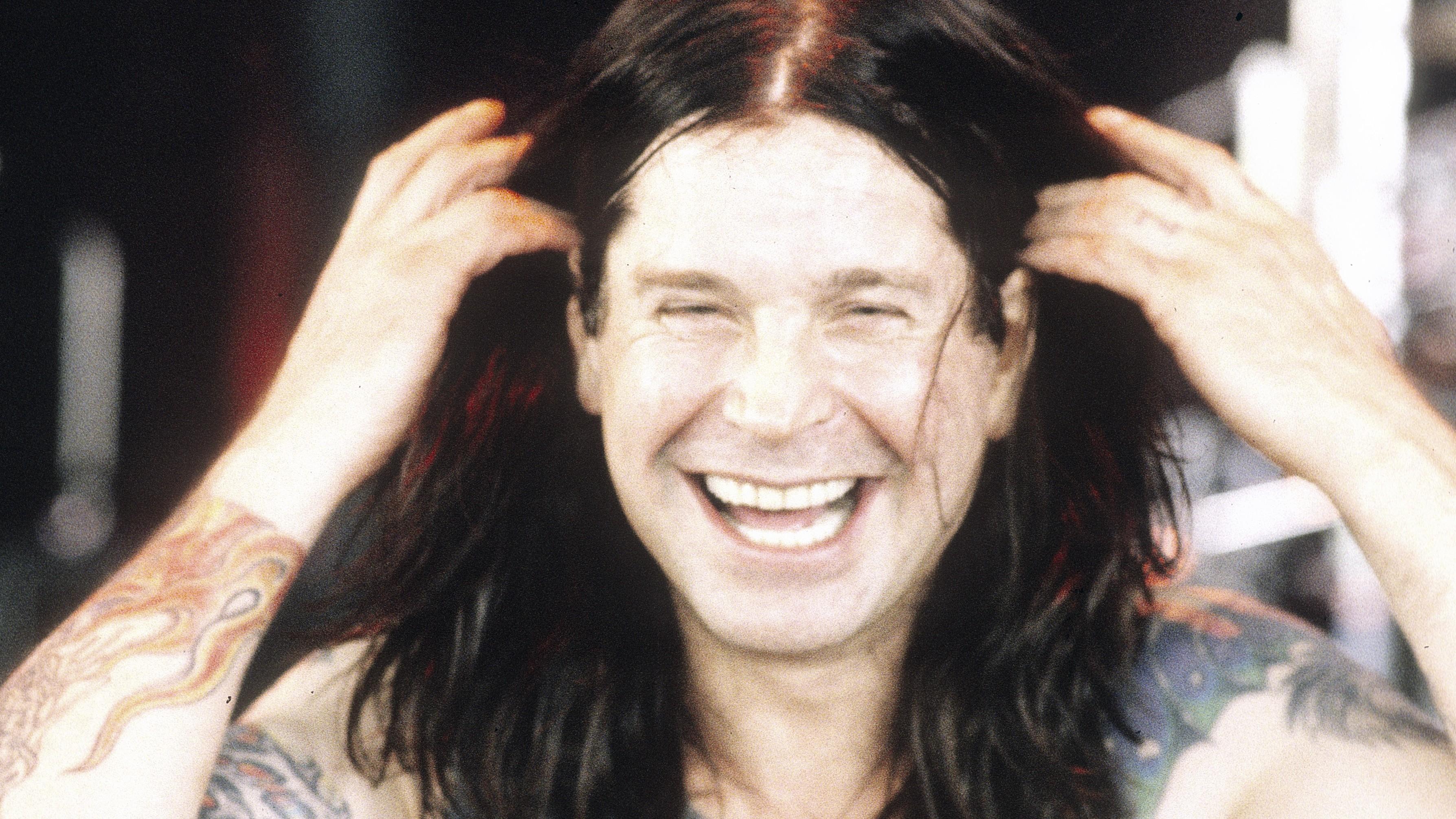
Looking Back on 2025
Some words and photos to look back on the year that was from So What! Editor Steffan Chirazi.
Nov 29, 2022
I’ve done many round-table interviews with Metallica over the decades. Each one brings a new flavor, and I never feel anything less than 100% comfortable. However, as I approached the gathering of All Within My Hands Scholars from West Virginia University at Parkersburg in PNC Park’s lower tier seats, I confess to feeling a tad anxious. Would my mics have enough range? Would they be able to understand my accent? Would my questions seem weird? Not only that, I was the last ‘act’ before lunch in what had been a pretty awesome day for them, seeing exactly what it takes to put on a Metallica show.
The students had seen everything, thanks to the mighty Metallica stage manager Dewey, and now, right before a well-deserved sandwich, was this jolly jester tossing questions at them with his golf ball-mouth accent! I need not have concerned myself because scholars Alex, Autumn, Conner, James, and Tim, along with faculty gents Doug and Jeremy, were marvelous subjects who helped me understand exactly how scholars directly benefit from the tremendous work AWMH and Wolverine have been doing with their partnership. What follows is an edit of our ‘in-the-stands’ conversation. I have edited this for clarity; however, the spirit and sentiment are as true as when they hit my ears back on that August Pittsburgh afternoon.
Steffan Chirazi: First of all, tell me a little bit about yourselves, how you got introduced to the Scholars program, and what you’re looking for from it. Can we start with you, Autumn? THE CAST
Doug Rhodes – Faculty
Jeremy Harrison – Faculty
Alex King – Scholar
Autumn McKenna – Scholar
Conner Walker – Scholar
James Walker – Scholar
Tim Crum – ScholarAutumn McKenna: Yeah, that’s fine. I am majoring in digital media production. I am currently in my third semester of schooling right now, and I believe I first heard about the Metallica Scholars in my first semester. At the time, I didn’t know I could apply to it or I could benefit from it in general, so I’ve only really been a part of Metallica Scholars for this semester. I think the whole thing is really cool, quite awesome. And as a digital media production student, getting to see the actual production of a big-scale concert is really eye-opening. It’s really amazing.
James Walker: I’m 42. I first heard about Metallica Scholars in my second semester. I was looking for a new line of work, so I’m looking to get some certifications through the scholarship and get that career network in engineering or security, something like that. I’m also a huge Metallica fan!
Alex King: I got my associate’s in computer science, and I’m working on CIT to see which type of computer-related major I would choose for my bachelor’s. I was applying for multiple different types of scholarships, and I just so happened to be applied to the Metallica Scholarship program. This is an amazing opportunity to come here to a Metallica concert and learn all these cool things. I was really excited. I haven’t listened to Metallica before, so this is a good, unique experience for me.
Doug Rhodes: I’m just going to jump in. Four of us drove together, and I kind of assumed everybody was a Metallica fan, but I just asked out of curiosity, “Did anyone sign up just for the experience?” And Alex said, “Yeah,” and we were all like, this is going to be awesome for him.
Tim Crum: I’m a software engineering major. I received the Metallica scholarship about three semesters ago for the first time, I’ve received it a couple times since then, and they have actually helped me out tremendously. I learned about it from my advisor. He said that the program had been awarded the grant from Metallica from the All Within My Hands Foundation, that it was going to be awarded to our department’s students, and I think they had enough to where they picked everybody. I think everybody that was in the department got it. So we were all selected, we all got free t-shirts, and we just recently got free codes to order boots from Wolverine. It’s just an amazing experience. They also pay for certification exams, and the Metallica Scholarship actually paid for two of my certification exams. I’m on the software engineering side of the house instead of the actual physical hardware, so they paid for a Linux administrator certificate for me to help. It’s a $200 a certificate for one exam, and you have to take two of them. So they paid for both of them, for me that’s 400 bucks. I think they allotted each student $400 for exams, and they give you, I think, a year to take them. And as long as they are industry-recognized certifications, they’ll pay for it. I found a couple that applied to the software engineering side, and they paid for it.
Conner Walker: I’m a visual media production major right now. I’m going into my third semester for it. Basically, I heard about the Metallica scholarship, I’ve heard the name around the college three times, and I finally got told about it by my instructor. I’m loving the actual experience that you get to see, and I love that they’re actually helping out with everything.
Jeremy Harrison: It’s all new to me, so I was like, I didn’t even know that this foundation really existed until I heard some colleagues talking about it. We ended up getting taken into the fold, but I think these guys had heard about it a little before I did.
Doug Rhodes: Yeah, I, so I’m a professor for the computer side of it, and we’re the ones that initially wrote the grant. I just got an email one day out of the blue from my boss that said, “Hey, just a heads up, we’re applying for this grant for the National Science Foundation, it’s the Metallica grant. If somebody calls you, that’s a real thing.” And I was like, “That’s a funny name!” Then I googled it and went, “Holy crap, it’s Metallica!” And then, a few months later, I got the email saying we got it. And I thought, holy crap, Metallica, that’s really cool. I was psyched for the students.
SC: Awesome stuff. James, I want to ask you, you came from a construction career which requires quite a mathematical brain in terms of putting stuff together, and then you switched career paths to what you’re doing. Do you think there’s a correlation between the two things that you’re working on?
JW: Yeah, it’s all logic-based, I guess. It’s challenging. I was out of work, I got laid off, and I always tinkered with computers. I was fixing everyone’s computer!
SC: Cool, and a general question here for all of you, what were your motivations for wanting to take this step into furthering your education, your careers?
A McK: My motivation for wanting to do digital media production, specifically, was my desire to create things. I’m an artist, and I draw, but I don’t want to do that for a living. I’ve tried to make money off of it. It’s quite miserable. So I wanted to get more into producing video because it’s a good creative outlet, and I’d say there’s a lot more of a market for that.
SC: Could you give me a snapshot of where your ideas bring you?
A McK: I love drawing a lot of different things, specifically psychedelic, almost trippy visuals. I love the hippy aesthetic mixed in with early internet vibes, like from the ‘90s. Putting those two together is my favorite thing. I also love horror a lot, and I think producing a horror movie would be awesome.
SC: And Alex, what pushed you to look for this and to go further with your education?
AK: My motivation for studying computers, like CS or CIT, came from really liking playing video games on the computer a lot. I was fascinated with how these games were designed, the design process, and all the types of genres, art styles, animations, and such. If I could pick a career after becoming a programmer, it would be a video game designer.
JW: I was motivated to begin with by my family. I’m married, and I have three children. I was laid off when Covid hit, so I was motivated to go back and finish schooling so that I could find a way to support them financially. So that’s what began my motivation. My motivation to go into the tech field or computer science was that I’d always been interested in computers. It was something that I felt that I had a passion for and that would make my professional life with regards to my life and career a lot more pleasing, a lot more satisfying.
CW: I always had a passion for working with cameras and audio when I was younger. I used to be a musician, and I still play sometimes, so I always wanted to do something in that field – either working with audio or working with video. To finally have the opportunity over here at WV Parkersburg, I was able to fulfill that idea. And so I’m just continuing to drive and push forward, seeing what I can do, and keep growing.
SC: Is it fair to say that financially, this has been the difference between being able to pursue some of those paths and really not having the opportunity?
AK: Definitely.
A McK: Yes.
JW: Yeah, absolutely.
CW: Yes.
DR: I’m going to jump in again for a second. Tim talked about it a little bit, but in the computer world, we have these third-party certifications, and they’re very cost prohibitive for a lot of students that are coming from a lower-income socio-economic background. We find it hard to get the financial aid system to pay for those. And when I was approached with, “We’ve got this grant from Metallica. What should we do with it?” I said, “Well, what are the restrictions?” Because that’s always typically the first thing you have to ask. And they said, “None, really.” It’s pretty much just asking us what we want. So I said I wanted certifications. I wanted my students to get the opportunity to take a certification or two, and they (AWMH) just absolutely went just right with it. It was amazing.
SC: That is really interesting to know. We never think of both the importance and expense of certification. Very cool. Now, let’s just briefly talk music. Who wants to shout out what they listen to when…let’s say when you’re driving somewhere?
JW: I listen to dark metal music. Metal and rock. As I Lay Dying, Killswitch Engage, Metallica too…I listen to death metal, such as Morbid Angel, Cannibal Corpse, and Obituary. You know, the first time I heard Metallica when I was a kid, it gave me an appreciation for what they put into the composition, the whole esthetics. It gave me an appreciation to work harder and want to be better.
A McK: I listen to psychedelic pop and also ‘80s pop. My favorite musician ever, he actually is based in Pittsburgh, is Jack Stauber, but I love Kiss. That’s one of my favorite bands ever — also, Duran Duran, stuff like that. If I’m on the radio, it’s ‘80s all the time.
CW: I listen to five different things. I listen to Green Day, Rush, White Wolves, Falling in Reverse, and Metallica. I’m also going to throw the weirdest one out there, video game soundtracks.
AK: I also listen to video game soundtracks. I listen to Death Note and DragonForce, such as “Through the Fire and the Flames.” I think the closest experience to a concert experience would be Trans-Siberian Orchestra.
SC: A final ambient question for you all. As you’ve looked around here today, seeing the big rock show coming together, have you had any momentary thoughts as to what you would maybe bring to a show like this, or a band like this?
JW: I’ve got a couple riffs I wrote!!!

Some words and photos to look back on the year that was from So What! Editor Steffan Chirazi.

Dominic Padua (aka Dom Chi) does many things very well, including the art of marbling. Steffan Chirazi visits his Sebastopol, CA, studio to learn more.

What you are diving into here is my personal journal with regards to the Back to the Beginning extravaganza. Much of it was written off-the-cuff, and the sheer magnitude of the event means that even now there are still pieces of “thought” swirling in the ether and making brain fall by the hour. These recollections, emotions, and observations are shared reflectively over three separate entries after the event and are split between an initial “post-event download” and then a more chronological reflection on our time in Birmingham…